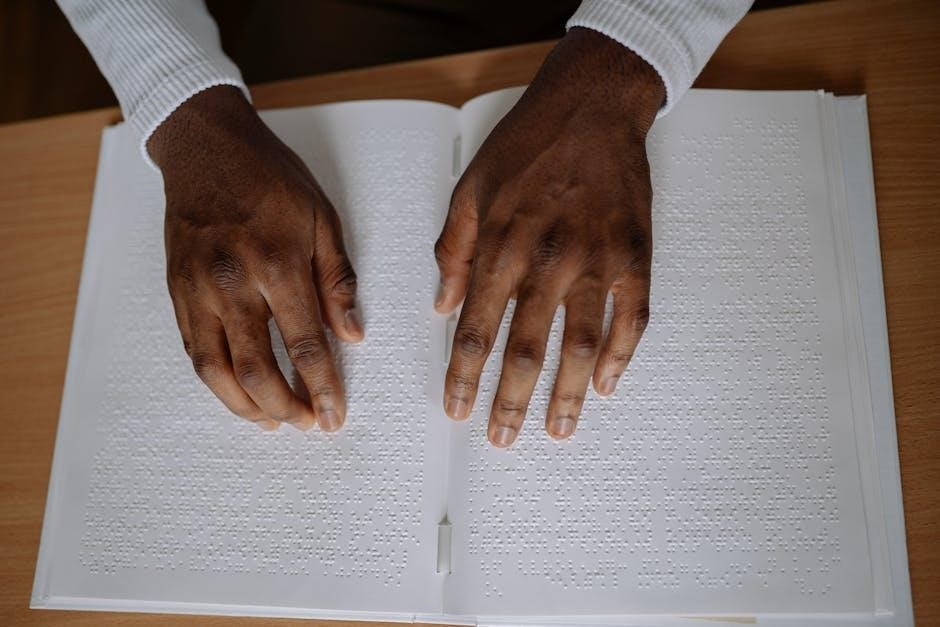
An instructional assistant in special education plays a vital role in supporting teachers and students‚ ensuring a safe and inclusive learning environment. Their duties include assisting with lesson plans‚ implementing Individualized Education Programs (IEPs)‚ and providing individualized or small group instruction to students with diverse needs. This role is essential for fostering academic‚ social‚ and emotional growth in students with special needs‚ making it a rewarding and impactful career in education.
1.1 Overview of Special Education and the Importance of Support Staff
Special education focuses on meeting the unique needs of students with disabilities through tailored instruction and support. Support staff‚ such as instructional assistants‚ are crucial in helping students achieve their Individualized Education Program (IEP) goals. They provide behavioral support‚ reinforce learning‚ and ensure a safe‚ organized classroom environment‚ enabling students with diverse abilities to thrive academically and socially.
1.2 The Role of an Instructional Assistant in Enhancing Student Learning
Instructional assistants play a pivotal role in enhancing student learning by providing individualized support‚ reinforcing instructional concepts‚ and helping students meet their IEP goals. They work closely with teachers to adapt strategies‚ use educational tools‚ and create engaging activities. By addressing diverse learning needs‚ they foster academic progress‚ social skills‚ and confidence‚ ensuring students receive the tailored support necessary for success in special education settings.
Key Duties and Responsibilities
Instructional assistants support teachers‚ assist with IEP implementation‚ provide individualized instruction‚ and manage classroom resources‚ ensuring a productive and organized learning environment for special education students.
2.1 Supporting Teachers in Lesson Planning and Instruction
Instructional assistants aid teachers by preparing instructional materials‚ modifying lessons for diverse learners‚ and assisting with group or one-on-one instruction. They help implement lesson plans‚ adapt activities‚ and provide feedback‚ ensuring students meet IEP goals. This support enhances the teaching process‚ allowing educators to focus on delivering high-quality instruction tailored to each student’s needs effectively.
2.2 Assisting with Individualized Education Programs (IEPs)
Instructional assistants play a key role in supporting the implementation of Individualized Education Programs (IEPs). They help monitor student progress toward IEP goals‚ provide targeted support during instruction‚ and collaborate with teachers to adapt strategies. Assistants may also assist in preparing for IEP meetings‚ documenting progress‚ and ensuring that accommodations and modifications are effectively implemented to meet each student’s unique needs.

Instructional Support Activities
Instructional assistants engage in activities that enhance student learning‚ such as working with small groups‚ reinforcing concepts‚ and preparing educational materials to support teaching objectives effectively.
3.1 Working with Small Groups or One-on-One with Students
Instructional assistants often work with small groups or one-on-one with students to provide personalized support. This includes reinforcing academic concepts‚ assisting with specific tasks‚ and helping students meet their Individualized Education Program (IEP) goals. They may also assist with activities like reading‚ writing‚ or problem-solving‚ ensuring students receive tailored attention to address their unique learning needs and challenges effectively.
3.2 Reinforcing Instructional Objectives and Concepts
Instructional assistants reinforce instructional objectives by reviewing and practicing concepts with students. They adapt teaching methods to meet individual needs‚ ensuring students grasp key ideas. This support helps students build confidence and mastery of skills‚ aligning with their IEP goals and promoting overall academic success in a structured and supportive learning environment.

Behavioral and Classroom Management
Instructional assistants support teachers in managing classroom behavior‚ monitoring student conduct‚ and providing individual support. They help maintain a safe‚ organized‚ and inclusive learning environment;
4.1 Monitoring Student Behavior and Providing Support
Instructional assistants monitor student behavior‚ ensuring a safe and respectful environment. They provide individual support‚ reinforce positive behaviors‚ and help students meet IEP goals. This includes observing behavior‚ offering guidance‚ and assisting with de-escalation techniques to promote social and emotional growth.
4.2 Helping to Maintain a Safe and Organized Learning Environment
Instructional assistants ensure a safe and organized classroom by supervising activities‚ organizing materials‚ and supporting safety protocols. They assist with physical needs‚ such as mobility or medical care‚ and maintain a clean‚ structured environment; This role is crucial for creating a stable setting that promotes learning and well-being for all students‚ especially those with special needs.
Clerical and Administrative Tasks
Instructional assistants manage clerical duties‚ such as preparing materials‚ organizing resources‚ and maintaining records. They also perform administrative tasks to support classroom operations efficiently and effectively.
5.1 Preparing Instructional Materials and Managing Classroom Resources
Instructional assistants prepare and organize instructional materials‚ such as duplicating handouts‚ creating visual aids‚ and setting up workstations. They manage classroom resources‚ ensuring materials are accessible and aligned with lesson plans. This includes adapting materials for students with diverse needs and maintaining supplies to support teaching and learning activities effectively.
5.2 Maintaining Student Records and Performing Administrative Duties
Instructional assistants manage student records‚ including updating progress reports and tracking IEP goals. They handle administrative tasks like attendance‚ grading‚ and organizing files. Ensuring confidentiality‚ they maintain accurate records to support teachers and inform student progress. These duties are crucial for efficient classroom operations and ensuring compliance with educational regulations.
Communication and Collaboration
Instructional assistants collaborate with teachers‚ parents‚ and staff to ensure effective communication about student progress and needs‚ fostering a cohesive educational environment.
6.1 Collaborating with Teachers and Other School Staff
Instructional assistants collaborate closely with teachers and school staff to align support with instructional strategies‚ ensuring a cohesive learning environment. They work together to monitor student progress‚ share insights‚ and adapt approaches to meet individual needs. This teamwork extends to administrators‚ counselors‚ and specialists‚ fostering a unified effort to support students’ academic and personal growth effectively.
6.2 Communicating with Parents and Guardians About Student Progress
Instructional assistants maintain open communication with parents and guardians‚ providing updates on students’ academic and behavioral progress. They share observations‚ highlight achievements‚ and discuss areas needing support‚ fostering collaboration between home and school. This communication helps align strategies‚ ensuring consistency in supporting students’ growth and well-being.

Health‚ Safety‚ and Wellness Support
Instructional assistants provide support for students’ medical needs‚ ensure safety during activities‚ and administer minor first aid‚ promoting overall wellness and security in the learning environment.
7.1 Assisting with Medical or Health-Related Needs
Instructional assistants often provide essential support for students with medical or health-related needs‚ including administering minor first aid and monitoring health conditions. They may assist with personal care‚ such as feeding or mobility‚ and ensure students’ physical well-being. Additionally‚ they maintain hygiene standards and safety protocols‚ collaborating with school nurses and staff to address medical emergencies and promote a healthy learning environment for all students.
7.2 Ensuring Student Safety During Activities and Field Trips
Instructional assistants play a crucial role in ensuring student safety during activities and field trips. They monitor behavior‚ provide supervision‚ and assist with mobility needs. By accompanying students on outings and maintaining a safe environment‚ they help prevent accidents and ensure compliance with safety protocols. This support allows students to fully participate in educational experiences while staying protected and secure.
Professional Development and Growth
Instructional assistants engage in professional development through training sessions and staff meetings to stay updated on special education policies and best practices‚ enhancing their skills and knowledge.
8.1 Participating in Training and Staff Meetings
Instructional assistants participate in training sessions and staff meetings to enhance their skills and stay informed about special education policies and practices. These sessions cover topics like IEP implementation‚ behavioral support‚ and instructional strategies. By attending in-service programs and collaborating with educators‚ they gain insights to better support students and adapt to evolving educational needs‚ ensuring effective and inclusive learning environments.
8.2 Staying Updated on Special Education Policies and Practices
Instructional assistants must stay informed about special education laws‚ such as IDEA‚ and evolving teaching practices. They engage in ongoing professional development to understand new strategies for supporting students with diverse needs. This includes adapting instructional methods and maintaining confidentiality of student records. By staying current‚ they ensure compliance with regulations and provide effective‚ individualized support to students‚ fostering an inclusive and equitable learning environment.

Working with Diverse Student Needs
Instructional assistants support students with various disabilities and learning challenges‚ adapting strategies to meet individual needs and ensuring personalized learning experiences for all students.
9.1 Supporting Students with Various Disabilities and Learning Challenges
Instructional assistants provide tailored support to students with diverse disabilities‚ including autism‚ ADHD‚ physical disabilities‚ and sensory impairments. They adapt strategies to meet individual learning challenges‚ ensuring students access the curriculum. By addressing unique needs‚ assistants help students achieve IEP goals‚ fostering independence and inclusivity in the classroom. This support enhances students’ academic and personal growth‚ promoting a positive learning experience.
9.2 Adapting Instructional Strategies to Meet Individual Needs
Instructional assistants tailor teaching methods to suit diverse learning styles and abilities‚ ensuring all students engage effectively. This includes modifying materials‚ using visual aids‚ and incorporating assistive technologies. By adapting strategies‚ assistants help students overcome challenges‚ fostering a personalized learning environment that promotes understanding and achievement‚ while aligning with IEP goals and individual student requirements for optimal educational outcomes.

Technology and Resource Utilization
Instructional assistants use educational software and assistive technologies to support student learning‚ adapting resources to meet diverse needs and enhance engagement through interactive and personalized tools.
10.1 Using Educational Software and Tools to Enhance Learning
Instructional assistants implement educational software and tools to support interactive and personalized learning experiences. They assist students in using assistive technologies and digital resources‚ adapting instruction to meet diverse needs. These tools enhance engagement‚ reinforce concepts‚ and provide real-time feedback‚ enabling students to track their progress effectively and stay motivated in achieving their learning goals.
10.2 Operating Audio-Visual and Therapeutic Equipment
Instructional assistants are responsible for setting up and operating audio-visual equipment‚ such as projectors and educational software‚ to enhance lessons. They also manage therapeutic devices‚ like speech-to-text tools or sensory aids‚ to support students’ specific needs. Ensuring equipment is functional and properly used‚ they facilitate engaging and effective learning experiences tailored to individual student requirements.

Legal and Ethical Considerations
Instructional assistants must understand and adhere to laws such as IDEA‚ ensuring confidentiality and ethical practices in handling sensitive student information to protect rights and ensure a safe learning environment.
11.1 Understanding and Implementing IDEA and Other Regulations
Instructional assistants must understand the Individuals with Disabilities Education Act (IDEA) and other regulations‚ ensuring legal compliance in special education. IDEA mandates personalized education plans and safeguards for students with disabilities. Assistants implement these regulations by supporting IEP goals‚ maintaining confidentiality under FERPA‚ and ensuring services are delivered as outlined; This ensures a free and appropriate public education (FAPE) in the least restrictive environment (LRE).
11.2 Maintaining Confidentiality of Student Records
Maintaining the confidentiality of student records is a critical duty for instructional assistants. Under FERPA‚ all student information‚ including IEPs and personal data‚ must be kept private; Assistants ensure records are stored securely‚ access is limited‚ and sensitive information is only shared with authorized personnel. Breaching confidentiality can result in legal consequences‚ emphasizing the importance of adhering to these protocols to protect students’ privacy and trust.
The role of an instructional assistant in special education is pivotal‚ offering both personal and professional growth while making a profound impact on students’ lives and education.
12.1 The Impact of Instructional Assistants on Special Education
Instructional assistants significantly enhance special education by supporting teachers‚ managing classroom activities‚ and providing tailored help to students. Their efforts ensure students meet IEP goals‚ fostering academic and personal growth. By handling clerical tasks and behavioral support‚ they enable teachers to focus on instruction‚ creating an inclusive and effective learning environment that promotes student success and well-being.
12.2 Future Prospects and Opportunities in the Field
The role of instructional assistants in special education is evolving‚ offering promising career growth. With increasing demand for specialized support‚ professionals can gain advanced certifications or transition into teaching roles. Opportunities for professional development‚ such as training in new technologies and methodologies‚ further enhance career prospects. This field remains rewarding‚ with the chance to make a lasting impact on students’ lives and education systems.